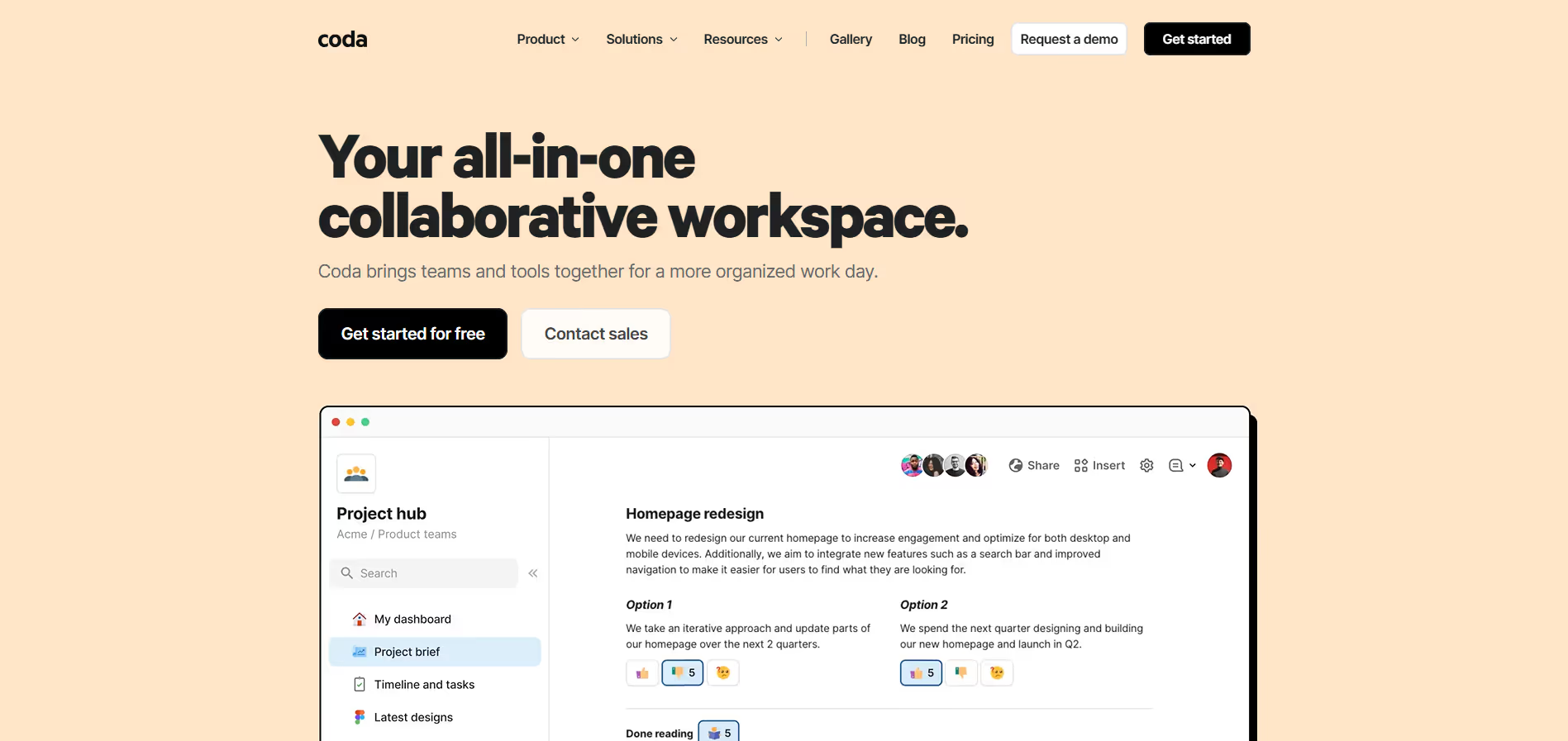Coda
Description
Key Applications
- Project Management: Tracking tasks, deadlines, and team progress within a dynamic document environment.
- Product Roadmaps: Building interactive roadmaps with interconnected data and status updates.
- Knowledge Bases: Creating centralized, searchable repositories for company information and documentation.
- Workflow Automation: Designing custom approval processes, data collection forms, and automated notifications.
- Meeting Notes: Structuring agenda items, capturing decisions, and assigning action items directly within a collaborative document.
Who It’s For
Pros & Cons
How It Compares
- Versus Notion: Coda offers more robust formula capabilities and deeper logic for building 'docs that can do apps,' often providing more powerful automation and custom tool creation than Notion, which focuses more on flexible databases and interconnected pages.
- Versus Google Docs/Sheets: Coda far surpasses the static nature of Google Docs by embedding interactive data, custom formulas, and app-like functionalities directly into documents, and offers more structured database features than Google Sheets alone.
- Versus Airtable: While both offer powerful database capabilities, Coda provides a more integrated document canvas for narratives and context around data, whereas Airtable is primarily a robust, flexible spreadsheet-database hybrid.
Bullet Point Features
- Blocks and Tables: Modular content blocks and powerful tables that function as mini-databases.
- Packs: Integrations with popular apps like Slack, Jira, Google Calendar, and more to pull in or push out data.
- Formulas: Spreadsheet-like formulas combined with programming logic for advanced calculations and automation.
- Automations: Built-in rules to trigger actions based on conditions or schedules.
- Cross-Doc: Link data and information seamlessly across multiple Coda documents.
- Views: Customize how data in tables is displayed (e.g., table, card, calendar, Kanban).
Frequently Asked Questions
Find quick answers about this tool’s features, usage ,Compares, and support to get started with confidence.

Coda is an all‑in‑one collaboration and productivity platform that lets teams build documents that behave like apps. Instead of juggling disparate tools like docs, spreadsheets, and project boards separately, Coda combines them into a single flexible workspace where text, data, automation, and interactive components work together seamlessly. This makes it easier to manage projects, plan work, and automate workflows without switching between multiple apps.

Coda lets you create customized documents that can contain tables, buttons, calendars, kanban boards, charts, and more — all in one place. You can link tables together, add formulas like a spreadsheet, and build interactive elements that respond to user actions. Because everything lives in a single doc, teams can centralize plans, data, and decisions, reducing context‑switching and improving clarity across projects.

Unlike basic text editors, Coda provides rich data structures, formulas, controls (like buttons and dropdowns), and automation. You can build tables that behave like databases, create automated rules that trigger actions, and embed interactive visuals that update in real time. Coda also supports pack integrations with tools like Slack, Google Sheets, Gmail, and Jira, so your doc can act as a central hub that connects work across the stack.

Yes — Coda includes built‑in automation features that trigger actions based on rules you define. For example, you can automatically notify teammates when a task is overdue, move items between tables when status changes, or update dashboards as data evolves. These automations reduce repetitive work and help keep team workflows moving without manual intervention.

Coda is ideal for product teams, operations professionals, project managers, marketers, and anyone who wants a flexible work platform. Users can expect faster collaboration, fewer disconnected tools, the ability to build solutions tailored to their workflows, and the opportunity to turn documents into powerful internal apps — all while keeping knowledge and actions in a single, unified workspace.





.avif)




